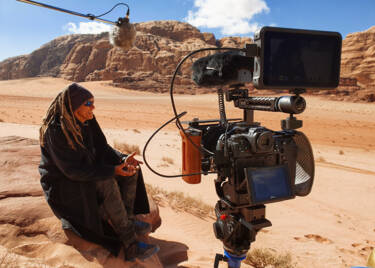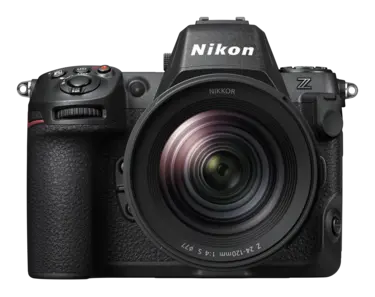Get a cage to free your camera

Camera cages allow you to attach all manner of accessories and help your workflow – and they’re not just for video, writes Dom Salmon
Think how camera tech has changed. A camera body used to be little more than a film spool and a shutter. Focusing and aperture control were on the lens and all the ‘look’ and light sensitivity were baked into the film stock. You would have a flash on the hotshoe or, in the studio, a lead to your flash gear (which I spent two decades tripping over). But that was about it.
Now? Everything is packed into those impossibly small bodies. Stacked sensors giving you every ISO under the sun. VR stabilisation for rock-solid shots. Wireless tech that sends pics to your phone as you take them. Super-fast memory cards allowing you to record slow-mo video at 4K.
Everything you need, right? Well, perhaps not. The more serious you become about shooting video, the more you might find yourself wanting or even needing to add accessories, however powerful your camera body is. And you can’t fit a monitor, ring light and wireless mic receiver on to a single hotshoe. This is where a camera cage can really be a game changer to your workflow. Let’s find out why.

Handle with care
For us Nikon users, changing the ergonomics of our camera must seem like heresy. Even users of other brands understand the allure of Nikon body shapes that sit so sweetly in the hand. However, a cage not only allows you to add accessories, but can actually change the way you shoot.
Adding a top handle to a camera cage makes things such as low angle shooting a breeze. Make sure you have VR engaged with your screen tilted up and wide-angle tracking shots, hand-held and on foot, are a revelation. Sam Raimi of Spider-Man and The Evil Dead fame made a career out of it! As a bonus, your camera is a lot easier to cart around on a long shooting day. Believe me, it makes a big difference after lunch.
Adding side handles to your cage can give you a great deal of added stability. Simple metal frames can bring another dimension to smartphone filming by increasing grip area and balance, and it’s doubly true with the heavier weight of a camera to operate.
I’m a big fan of adding handles to help with hand-held shooting. I don’t know why, but you just start making shots that seem to have more dynamism and movement – it seems, subconsciously, that they let you make shots that are more expansive and flowing. It’s an instant uptick to your creative repertoire.
In the picture
Probably my favourite thing about using a cage is the ability to add a monitor. My Nikon Z screens are nice, bright and clear, but having a bigger screen just makes life a lot easier on long video shoots.
I have an Atomos Ninja, which is both a monitor and recorder, which I can also record N-Log straight into. On a shoot, it means I’m less focused on the screen because I can check exposure and focus from a significantly improved distance, meaning I can concentrate on the scene. This is a massive advantage when you are shooting solo and interviewing a subject. It’s very off-putting to your interviewee if you are squinting at your camera screen and not paying attention to them.
Try seeing how your workflow changes by adding a simple and inexpensive 7-inch screen such as the Atomos Shinobi 7 (easy to connect from your Nikon’s HDMI out). You’ll feel much more aware of the scene and what’s going on. Again, it’s a subtle workflow change, but it really helps unlock you being more of a director than a videographer. (Add some headphones and you’ll look a total pro!)

Access all accessories
The beauty of having a camera cage is you can add multiple accessories to further boost your production values and your shot options.
First up: sound. Your camera’s internal mic is great for capturing speech, but you need to be up pretty close to your subject. Sound is key to content video. You can fudge or edit round the occasional focus miss or pass off wobbly footage as ‘giving energy’, but if you can’t hear what your subject is saying there’s no getting around it. Pretty early on in your video journey, a remote mic set-up is a must to help you get crystal clear audio in your content on location. The RODE Wireless Go II is a great option.
Good news, just attach the mic to your subject, the receiver to your cage, plug its cable into your Nikon’s mic input and – bingo! Pro sounding audio. Plus, you can place your camera to get the shot you want, not where it needs to be to hear what’s going on.
Another great and super cheap addition to your camera bag, and camera cage, is a small LED light. Even though camera sensors are so advanced now you can film people in super low-light, one of these is great just for a little extra fill on a subject, also giving them a nice ‘catch-light’ in their eyes, similar to what flash does in portrait photography. Even just half a stop gives a significant ‘lift’ to a person in frame. Oh, and I have one that can also do lightning, strobe and police light effects!
Have it large
You’re hopefully starting to see that, however powerful your camera is, and how we’ve come light years from the shutter and spool days, things such as better sound, better movement, a better overview of a scene and a little extra lighting finesse, all start to add a very noticeable special sauce to your videos. So, why stop there?
Even on my Nikon Z 6II I can often add a matte box to make sure no extraneous light creeps into the lens as nasty flares. I also use the cage to help attach my camera to simple tripod-based sliders to get buttery smooth tracking shots. If I’m flying solo, I’ll have a monitor/recorder attached to help me direct the scene, plus my mic receiver. The accessories added can often dwarf the camera itself! But…

Flex your creative muscles (not your actual muscles)
…in a couple of minutes, I can take everything off, quickly attach a top handle and run up some stairs after someone! Nothing kills creativity like having to muck about with gear when you should be filming, but the beauty of a cage is you can go from low-down tracking shots, to static studio interviews, to run and gun — and changing your set-up can take minutes, especially with a little practice to discover the best workflows for your particular sort of filming.
Not just for video!
Even for stills photography, I find my camera cages super useful. I can attach a flash so it’s ‘off-axis’ to the lens, which gives a more flattering light. Or I can attach a quick key-light to help my pictures retain a natural look but have a little boost for the subject. A single side handle is also useful to make me ‘quick on the draw’ at events and is also handy to keep fatigue down when running around.
Which all now means that I don’t bother to take them off my Z 6IIs. There is a very slight compromise to handling from that beautiful Nikon feel, but you get used to it very quickly and the added flexibility is totally worth it.
Where to start?
Here at Nikon we recommend SmallRig cage systems, and you can expand your add-ons as you start working out what set-up works for you.
The other biggest benefit? When you inevitably drop your camera, the cage (and probably your foot) will take the brunt of the blow – not your precious camera.
More tips and tricks
Featured Products
Discover the flagship Z 9
Capturing the essence of Kenya with Roie Galitz and the Z 9
Capturing raw sporting emotion with the Nikon Z 9

Unleash your creativity











